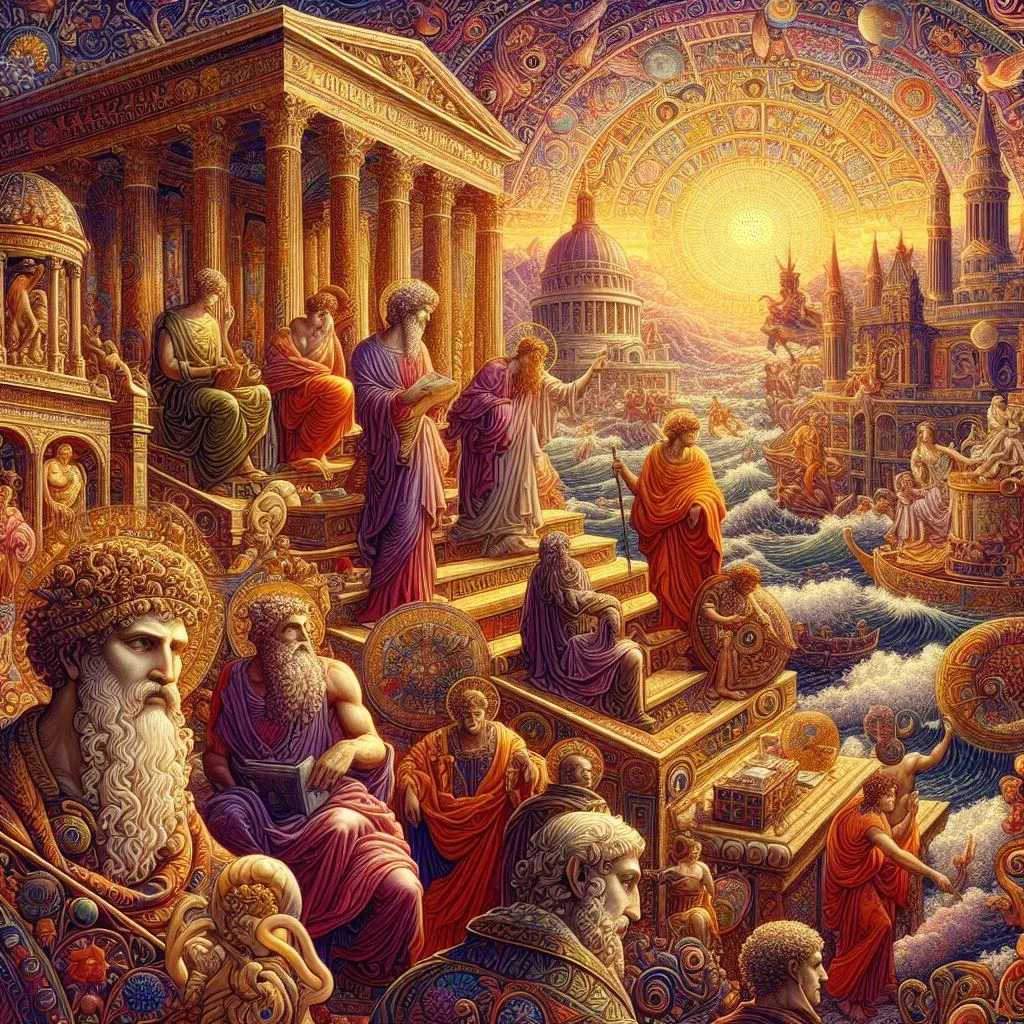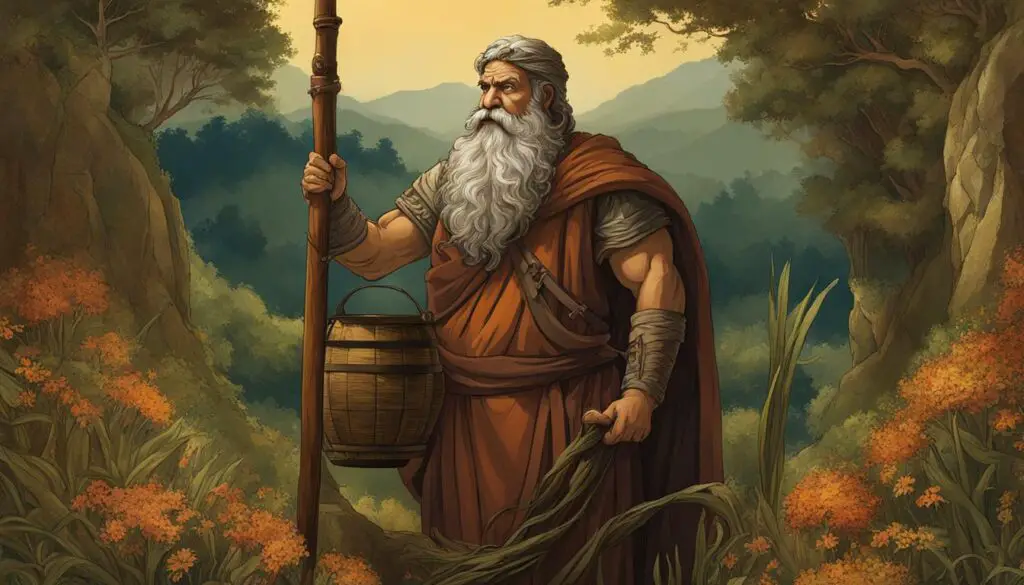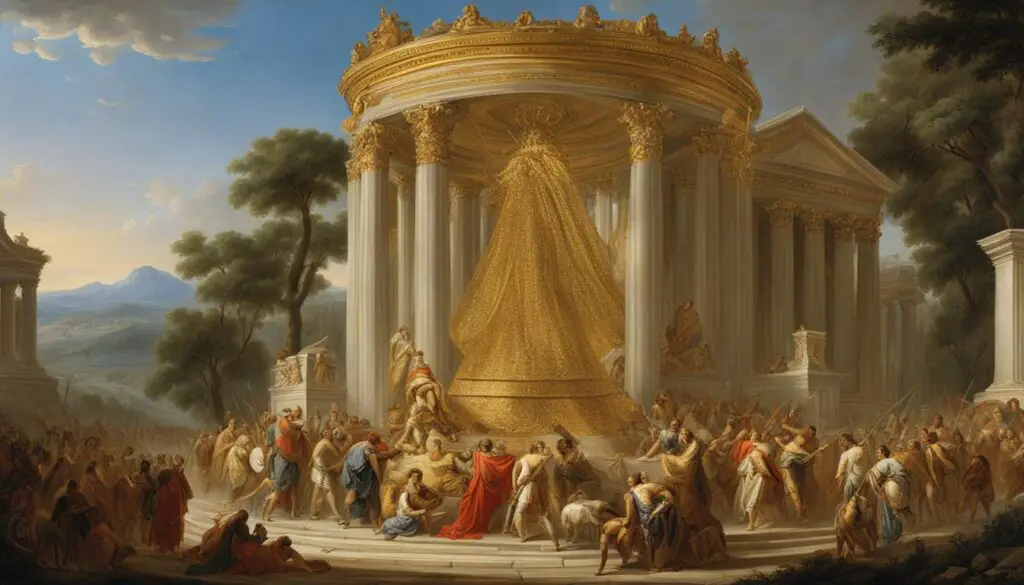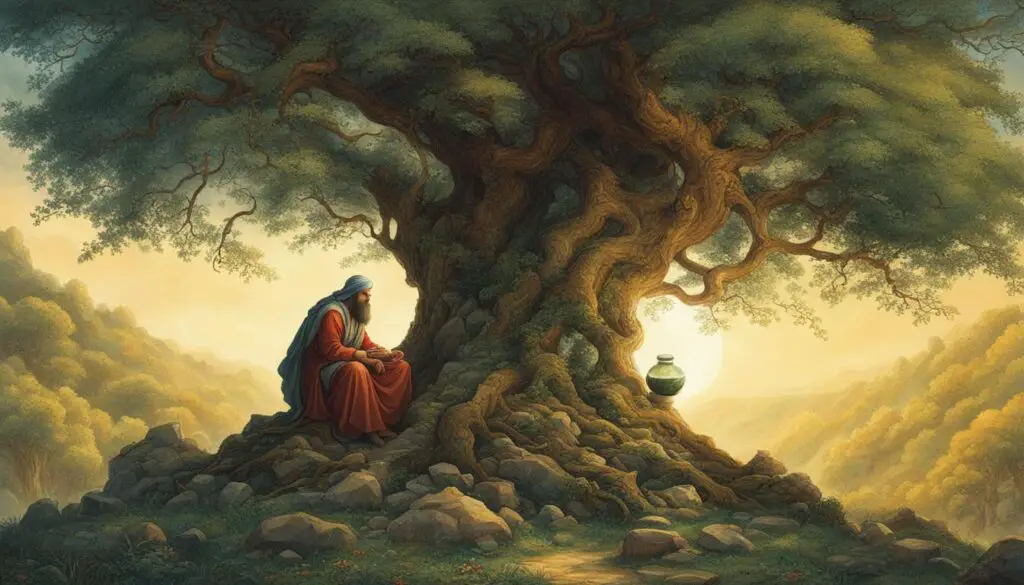My name is Mark and I am a lover of stoicism and philosophy. Today, I will introduce you to the life and works of Greek philosopher Diogenes of Sinope, one of the main names in the philosophical current of Cynicism. Diogenes was a man who challenged the artificial values and pleasures of Greek society, living simply and authentically. His philosophy influenced not only Stoicism, but also thinkers from different eras.

Diogenes was born in 413 BC in the city of Sinope, located in modern-day Türkiye. After his father's arrest and subsequent exile, he settled in Athens, where he spent most of his life. Abandoning material possessions, Diogenes adopted an austere lifestyle, living in a barrel and practicing self-sufficiency. He associated himself with the Cynic movement, which valued the renunciation of artificial pleasures and the search for wisdom.
Main philosophical concepts of Diogenes of Sinope
Diogenes of Sinope defended the self-sufficiency as one of the main foundations of his philosophy. He believed that true wealth was in virtue and not in material possessions. He sought freedom by rejecting the excesses of society and simplicity by living in a minimalist way.
Another important concept for Diogenes was the criticism of artificial pleasures of Greek society. He rejected luxury and material values, seeking a life in harmony with human nature. Diogenes believed that true wisdom lay in the renunciation of superficial pleasures and the pursuit of virtue.
Main works and legacy
Although we have no written records of Diogenes' works, we know that his ideas were recorded by later followers and philosophers. Your lifestyle and your philosophical reflections influenced future philosophical currents, such as stoicism.

Diogenes of Sinope left a significant legacy for the history of philosophy, reflecting on human nature, the search for virtue and the importance of self-sufficiency. His example of resistance and simplicity still inspires us today.
Key Points to Remember
- Diogenes of Sinope it was a Greek philosopher from the Hellenistic period, belonging to the philosophical current of Cynicism.
- He abandoned material possessions and adopted an austere lifestyle, living out of a barrel and practicing self-sufficiency.
- Diogenes criticized the artificial values and pleasures of Greek society at the time, seeking wisdom and simplicity.
- His philosophy influenced later currents, such as Stoicism, and inspires us to this day.
- The main philosophical concepts of Diogenes are self-sufficiency and criticism of artificial pleasures.
The Trajectory of Diogenes of Sinope and the Ideal of the Simple Life
The story of Diogenes of Sinope began with his exile and the arrest of his father for counterfeiting coins. This event was a turning point in his life, leading him to abandon material possessions and adopt a simple, minimalist lifestyle. Born in 413 BC in the city of Sinope (present-day Turkey), Diogenes lived most of his life in Athens, becoming one of the best-known philosophers of antiquity.

From exile to wisdom: the origin of Diogenes’ cynical thought
After exile, Diogenes found a new understanding of life and philosophical purpose. He was part of the Cynic movement, which emphasized the renunciation of artificial pleasures and the search for wisdom and self-sufficiency. Diogenes saw Cynicism as a response to the materialism and decadent luxury of Greek society at the time. For him, true happiness was living in harmony with nature and seeking personal authenticity.
Under the shadow of the barrel: the practice of austerity
Diogenes was known for living in a barrel, practicing austerity and rejecting social excesses. This lifestyle choice reflected his belief in simplicity and the pursuit of a more authentic life. Living with the minimum necessary to survive, he demonstrated that true wealth was not in material goods, but in virtue and self-sufficiency.
Cynicism as a response to materialism
The Cynic movement, to which Diogenes belonged, emerged as a response to the materialism and artificial pleasures of Greek society. Cynicism valued the renunciation of luxuries and the search for true wisdom. Diogenes adopted these principles into his philosophy, believing that self-reliance and simplicity were the path to a full and meaningful life.

| Origin of Cynical Thought | Practice of Austerity | Cynicism as a Response to Materialism |
|---|---|---|
| Cynicism emerges as a response to the luxury and materialism of Greek society. | Diogenes lives in a barrel, practicing austerity and rejecting social excesses. | Cynicism values the renunciation of artificial pleasures and the search for self-sufficiency. |
| Diogenes adopts Cynicism as a philosophy of life, seeking to live in harmony with nature. | He believes that true wealth lies in virtue and self-sufficiency, not material possessions. | Diogenes sees Cynicism as a path to an authentic and meaningful life. |
Diogenes and Cynicism: A Path to Freedom and Self-sufficiency

The philosophy of Antisthenes: the basis of Diogenes' thought
The philosophy of Diogenes of Sinope was deeply influenced by the teachings of his mentor, Antisthenes. Antisthenes founded the School of Cynicism and taught the importance of virtue and self-reliance. Diogenes followed in his master's footsteps and deepened these ideas, shaping his own Cynic philosophy.
Criticism of artificial pleasures and the search for human nature
One of the main focuses of Diogenes' philosophy was the criticism of artificial pleasures of Greek society at the time. He questioned the incessant search for luxury and material wealth, believing that this led people to an empty life and alienated from their true nature.
Diogenes proposed an austere and simple life, in harmony with human nature. He sought satisfaction in basic needs and rejected society's excesses, defending the importance of self-sufficiency and simplicity as paths to true freedom.
The paradox between Greek society and cynical life
Diogenes' philosophy was a paradox in relation to Greek society at the time. While society valued luxury, ostentation and the search for material pleasures, Diogenes lived simply and detachedly.
His cynical, often insolent stance challenged social values and norms, highlighting the contrast between the artificial and superficial world of Greek society and the search for an authentic life in tune with human nature.
Diogenes' philosophy reveals the tension between cynical ideals and the reality of Greek society, highlighting the importance of questioning social conventions and seeking freedom and authenticity.

The Meeting Between Diogenes and Alexander: Conflict of Ideals and Search for Truth
The challenge to power: Diogenes and his known insolence
One of the defining moments in the life of Diogenes of Sinope was the meeting with Alexander, the big. Alexander, impressed by the philosopher's fame, went to Diogenes to question him about his desires and needs. Diogenes, known for his insolence, responded with his well-known phrase, demonstrating his detachment from earthly powers.

“Do not come between my sun!”
This challenge to Alexander's power revealed Diogenes' stance towards simplicity and virtue, contrasting the conqueror's luxury and grandeur. Diogenes represented a philosophical vision that valued self-sufficiency, austerity and the search for truth.
Luxury versus simplicity: dialogue with Alexander the Great
The meeting between Diogenes and Alexander the Great symbolized the contrast between the values of luxury and ostentation represented by Alexander and the simplicity and self-sufficiency preached by Diogenes. While Alexander possessed all the power and wealth in the world, Diogenes lived with the minimum necessary to survive, in a barrel.

While Alexander sought to conquer territories and accumulate wealth, Diogenes challenged power and material greatness, proposing a life in harmony with nature and wisdom.
In the next topic, we will explore the legacy of Diogenes of Sinope and his contributions to the history of philosophy.
Diogenes of Sinope
Legacy and contributions to the history of philosophy
Diogenes of Sinope left a significant legacy in the history of philosophy. Your philosophical reflections and its insight into human nature influenced subsequent philosophical thought. His minimalist lifestyle and quest for self-sufficiency defied the social conventions of his time. Diogenes questioned the artificial values and pleasures of Greek society, seeking a more authentic life in tune with human nature. His story and his works are remembered as examples of resistance and the search for truth, being a source of inspiration to this day.

Philosophical reflections and views on human nature
As philosophical reflections by Diogenes of Sinope covered various aspects of human life and the search for wisdom. He questioned Greek society and its materialistic values, promoting a more authentic and integral view of human nature. Through his reflections, Diógenes invites us to reflect on the importance of simplicity, self-sufficiency and self-knowledge. His philosophy shows us that true wealth lies in virtue and authenticity, and not in material goods. His ideas remain relevant and offer profound insights into human nature and the quest for a meaningful life.
The Concept of Self-Sufficiency in the Philosophy of Diogenes
One of the central concepts in the philosophy of Diogenes of Sinope is that of self-sufficiency. Diogenes believed in virtue of detachment to material goods and the importance of becoming self-sufficient to achieve true happiness. He practiced Minimalism and rejected social excesses, living with the minimum necessary to survive. For Diogenes, true wealth was not in material goods, but in virtue and the ability to self-manage. Self-sufficiency was seen as a form of freedom and resistance to the pressures of society and artificial pleasures.

The virtue of detachment and the power of autarky
Diogenes' philosophy emphasizes the importance of detachment from material goods as a virtue to be cultivated. He believed that happiness and freedom are intrinsically linked to the ability to let go of material possessions and the desire to accumulate wealth. For Diogenes, true wealth lies in the ability to be self-sufficient, to find inner satisfaction and not depend on the external world for your happiness. A virtue of detachment it allows a person to free themselves from worries and anxieties related to the search for material goods, allowing them to live a more authentic and fulfilling life.
Minimalism and the rejection of social excesses
O Minimalism is a key aspect of Diogenes' philosophy and is closely linked to the self-sufficiency concept. Diogenes rejected social excesses and lived with the minimum necessary to survive, distancing himself from superfluous needs and desires. He believed that the pursuit of material wealth and the pursuit of artificial pleasures were sources of suffering and dissatisfaction. By adopting a simple, minimalist lifestyle, Diógenes found a freedom that allowed him to focus his energy on the pursuit of wisdom and self-sufficiency. That rejection of social excesses allows for a greater connection with nature and the world around us, providing a sense of harmony and balance.
Stoic Inflammation in the Teachings of Diogenes of Sinope
Os teachings of Diogenes of Sinope were in line with many of the principles of Stoic philosophy. Although they belonged to different philosophical currents (Cynicism and Stoicism), Diogenes and the Stoics shared some meeting points. Both currents emphasized the importance of self-sufficiency, the search for virtue and the acceptance of external events that cannot be controlled.
Diogenes teaches us about the importance of stoic virtues, such as courage, temperance and wisdom, and how we can apply them in our own lives. A stoic inflammation our teachings of Diogenes highlights the timeless relevance of his philosophies and their ability to inspire people to this day.

Stoicism X Cynicism: meeting points in Diogenes’ philosophy
Stoicism and Cynicism have elements in common that are connected in the philosophy of Diogenes of Sinope. Both philosophical currents valued self-sufficiency as a way to achieve wisdom and virtue. Diogenes shared this vision of autonomous life and sought independence from luxury and artificial pleasures.
The Stoics and Diogenes believed in the importance of accepting external events that we cannot control, thus cultivating an attitude of balance and serenity in the face of life's adversities. This encounter between Stoicism and Cynicism in Diogenes' philosophy shows how different currents can converge in search of a more authentic and virtuous life.
Stoic virtues: What can we learn from Diogenes?
Os teachings of Diogenes of Sinope invite us to reflect on the stoic virtues and how we can apply them in our lives. Courage is an essential virtue, which drives us to face challenges and adversities with determination and audacity.

Temperance is another virtue highlighted by Diogenes and the Stoics, which teaches us to find balance in our actions and avoid harmful excesses. Wisdom, in turn, invites us to seek self-knowledge and find the true essence of life.
By incorporating these virtues into our daily lives, we can learn from Diogenes and apply his teachings in search of a more meaningful life in accordance with the stoic virtues.
| Stoic Virtues | Teachings of Diogenes |
|---|---|
| Courage | Diogenes demonstrated courage by confronting power and challenging social conventions |
| Temperance | Diogenes practiced austerity and rejected social excesses, living with the bare minimum |
| Wisdom | Diogenes sought wisdom and self-knowledge as forms of self-sufficiency and the search for virtue |
Conclusion
Diogenes of Sinope was a Greek philosopher who defied the social conventions of his time and sought a simple and authentic life. His minimalist lifestyle and quest for self-sufficiency have inspired many philosophers and thinkers over the centuries. His philosophy, based on the principles of Cynicism, reflected on human nature, the search for virtue and criticism of artificial pleasures.
Diogenes left a significant legacy for the history of philosophy, influencing later currents such as Stoicism. His life, works and teachings invite us to reflect on the importance of simplicity, self-sufficiency and self-knowledge in our lives. By questioning the values and excesses of Greek society at the time, Diogenes challenges us to rethink our own choices, seeking a more authentic life in harmony with human nature.
In a world increasingly dominated by materialism and ephemeral pleasures, Diogenes' ideas are more relevant than ever. His philosophy reminds us that true wealth lies in virtue, self-knowledge and the ability to live a simple and authentic life. Looking to the life and teachings of Diogenes, we can find inspiration to question social conventions, seek wisdom, and find our own inner truth.
FAQ
Q: Who was Diogenes of Sinope?
A: Diogenes of Sinope was an ancient Greek philosopher who stood out in the philosophical current of Cynicism.
Q: Where was Diogenes of Sinope born?
A: Diogenes was born in 413 BC in the city of Sinope, which is currently located in Turkey.
Q: What was Diogenes' lifestyle?
A: Diogenes adopted a simple and austere lifestyle, living in a barrel and associating himself with the Cynic movement.
Q: What were Diogenes' philosophical concepts?
A: Diogenes sought wisdom and self-sufficiency, criticizing the artificial values and pleasures of Greek society at the time.
Q: Who was Diogenes' teacher?
A: Diogenes was a disciple of Antisthenes, who was the founder of the School of Cynicism.
Q: What was the defining encounter in Diogenes' life?
A: Diogenes had a remarkable meeting with Alexander the Great, where he demonstrated his insolence and rejection of the excesses of power.
Q: What was Diogenes' influence on philosophy?
A: Diogenes left a significant legacy for the history of philosophy, reflecting on human nature and teaching the importance of self-sufficiency and the pursuit of virtue.
Q: What was the concept of self-sufficiency in Diogenes' philosophy?
A: Diogenes believed in virtue of detachment to material goods and the importance of becoming self-sufficient to achieve true happiness.
Q: What was Diogenes' lifestyle?
A: Diogenes adopted a minimalist lifestyle and rejected social excesses, living with the minimum necessary to survive.
Q: What were the meeting points between Diogenes' stoicism and cynicism?
A: Both Stoicism and Cynicism emphasized the importance of self-reliance, the pursuit of virtue, and acceptance of external events that cannot be controlled.
Q: What was Diogenes' legacy in philosophy?
A: Diogenes left a significant legacy in the history of philosophy, influencing later trends and inspiring people to this day.






